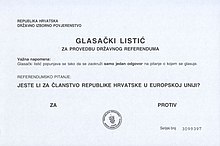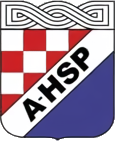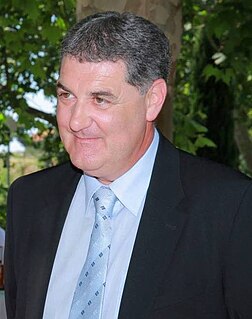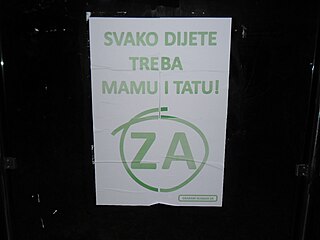| Croatian European Union membership referendum, 2012 | ||||||||||||||||||||||
|---|---|---|---|---|---|---|---|---|---|---|---|---|---|---|---|---|---|---|---|---|---|---|
| Approves accession of the Republic of Croatia to the European Union, as required prior to the Croatian Parliament ratifying the EU Accession Treaty | ||||||||||||||||||||||
| ||||||||||||||||||||||
| ||||||||||||||||||||||
| Source: State Election Committee [1] | ||||||||||||||||||||||
A referendum on the EU accession of the Republic of Croatia was held on 22 January 2012. Croatia finished accession (membership) negotiations on 30 June 2011 and signed the Treaty of Accession on 9 December 2011, setting it on course to become the bloc's 28th member state. The Constitution of Croatia requires that a binding referendum be held on any political union reducing national sovereignty, such as via European Union membership. On 23 December 2011 the Croatian Parliament made a preliminary decision on EU accession and determined that the referendum would be held on 22 January 2012. The 2012 Croatian EU accession referendum was the first referendum held in Croatia since the Croatian independence referendum held more than 20 years earlier, in 1991.

Croatia, officially the Republic of Croatia, is a country at the crossroads of Central and Southeast Europe, on the Adriatic Sea. It borders Slovenia to the northwest, Hungary to the northeast, Serbia to the east, Bosnia and Herzegovina, and Montenegro to the southeast, sharing a maritime border with Italy. Its capital, Zagreb, forms one of the country's primary subdivisions, along with twenty counties. Croatia has an area of 56,594 square kilometres and a population of 4.28 million, most of whom are Roman Catholics.

The Treaty of Accession 2011 is an agreement between the member states of the European Union and Croatia concerning Croatia's accession to the EU. It was signed on 9 December 2011 in Brussels by the heads of state or government of the 27 member states and by the President of Croatia, Ivo Josipović, and Prime Minister Jadranka Kosor.

The European Union (EU) consists of 28 member states. Each member state is party to the founding treaties of the union and thereby subject to the privileges and obligations of membership. Unlike members of most international organisations, the member states of the EU are subjected to binding laws in exchange for representation within the common legislative and judicial institutions. Member states must agree unanimously for the EU to adopt policies concerning defence and foreign policy. Subsidiarity is a founding principle of the EU.
Contents
- Background
- Voting issues
- Date
- Campaign
- Opinion polls
- Results
- Reactions
- Aftermath
- See also
- Notes
- References
The Croatian EU accession referendum campaign officially began on 3 January 2012; a yes vote was supported by both the political parties in government and the larger opposition parties in Croatia. The largest parties' joint support of EU membership existed since 2005, when the Alliance for Europe (Croatian : Savez za Europu) was set up as an informal alliance aimed at achieving membership as a strategic goal of Croatian foreign policy. Opposition to Croatian EU accession was voiced by non-parliamentary parties only. The pro-membership and informational campaign – which included television promotional videos, addresses by leading government and opposition politicians, and information booklets mailed to every household in Croatia – was announced to have cost 4.8 million kuna (c. € 640,000). Opinion polling was regularly carried out by three different agencies; since May 2011, percentages supporting EU membership ranged between 55% and 63%. The Croatian State Election Committee was in charge of vote organization, ballot counting and result publication.

Croatian is the standardized variety of the Serbo-Croatian language used by Croats, principally in Croatia, Bosnia and Herzegovina, the Serbian province of Vojvodina and other neighboring countries. It is the official and literary standard of Croatia and one of the official languages of the European Union. Croatian is also one of the official languages of Bosnia and Herzegovina and a recognized minority language in Serbia and neighboring countries.
The Republic of Croatia is a sovereign country at the crossroads of Central Europe, Southeast Europe, and the Mediterranean that declared its independence from SFR Yugoslavia on 25 June 1991. Croatia is a member of the European Union (EU), United Nations (UN), the Council of Europe, NATO, the World Trade Organization (WTO), Union for the Mediterranean and a number of many other international organizations. Croatia has established diplomatic relations with 181 countries. President and the Government, through the Ministry of Foreign and European Affairs, co-operate in the formulation and implementation of foreign policy.

The kuna is the currency of Croatia, in use since 1994. It is subdivided into 100 lipa. The kuna is issued by the Croatian National Bank and the coins are minted by the Croatian Monetary Institute.
The EU accession referendum passed with 66.27% votes cast in support, 33.13% against the proposed joining of the EU and 0.60% invalid or blank votes; it also passed in all Croatian counties. The greatest support for the referendum was recorded in Međimurje and Brod-Posavina counties, at 75.73% and 72.61% respectively. The lowest support for EU accession was recorded in Dubrovnik-Neretva County, where 42.22% of votes were cast against the proposal. The average official turnout for the referendum was 43.51%; the highest official turnouts were recorded in the city of Zagreb and in Varaždin County at 55.13% and 53.66% respectively. The result was binding on the Croatian Parliament; as a consequence, it ratified the accession treaty on 9 March 2012. The outcome was welcomed by all political parties represented in Croatia's parliament; some right-wing politicians objected to the low turnout and what they consider a loss of independence.

The counties of Croatia are the primary administrative subdivisions of the Republic of Croatia. Since they were re-established in 1992, Croatia has been divided into 20 counties and the capital city of Zagreb, which has the authority and legal status of both a county and a city. As of 2015, the counties are subdivided into 128 cities and 428 municipalities.

Međimurje County is a triangle-shaped county in the northernmost part of Croatia, roughly corresponding to the historical and geographical region of Međimurje. Despite being the smallest Croatian county by size, it is the most densely populated one. The county seat is Čakovec, which is also the largest city of the county.

Brod-Posavina County is the southern Slavonian county in Croatia. Its center is the city of Slavonski Brod and it spreads along the left bank of the Sava river, hence the name Posavina. Other notable towns include Nova Gradiška.






















